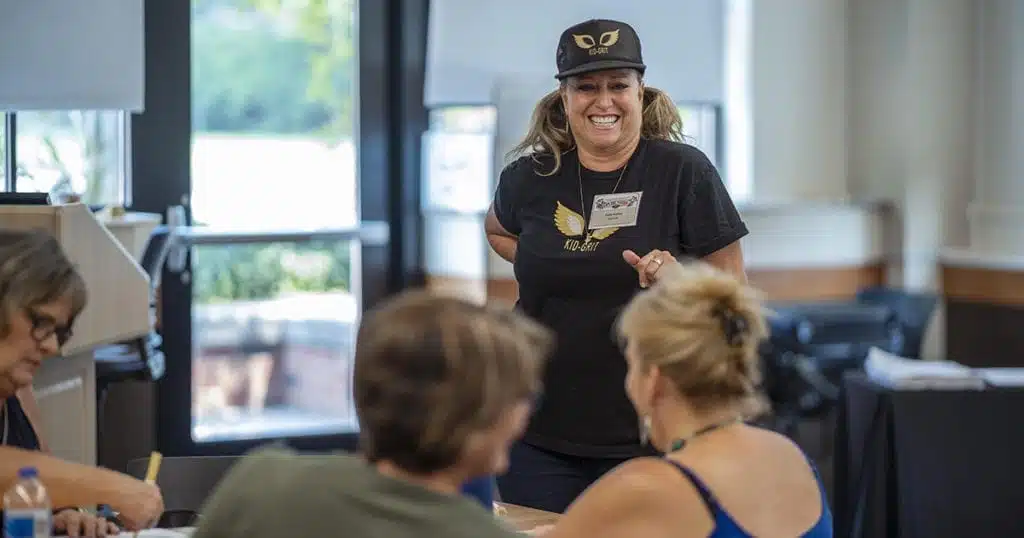

At kid-grit, our mission is to equip educators, students, and families with the knowledge and tools to build confidence, character, resilience, and self-care.
The kid-grit collective offers robust research-based programs that include curricula, student workshops, evidence-based professional development and coaching, leadership development programs and executive coaching, and workshops for families and adult learners.
Our robust offerings are focused on 21st Century skills (curiosity, critical thinking, creativity, collaboration, and communication) and anchored in real-life themes that include human and emotional intelligence, wellness, self-awareness, digital literacy, and mastery of learning.
The kid-grit collective is dedicated to equipping educators and students with the tools for success through an innovative, thoughtful approach that emphasizes emotional intelligence, character development, resilience, mental health and wellness.
Research-Based Curricula: Our foundational 25-hour, inquiry-based curriculum for Pre-K -12 integrates growth mindset learning, emotional intelligence, and 21st Century skills (curiosity, critical thinking, creativity, collaboration, and communication). Based on the 21st Century framework from Battelle for Kids, our programs focus on future-ready skills such as creativity and innovation, critical thinking and problem-solving, communication and collaboration, information, media, and technology skills.
Our foundational life-skills curriculum pillars are named Mind, Body, Community, and Digital Awareness. Newly, we are also offering the Art of Play: Engaging Strategies and Games to Build Essential Life Skills and a sports-based youth development program also focused on our four pillars.
Moreover, to showcase these skills, each of our programs suggests a culminating event, a mastery of learning, to showcase how these skills apply to real-life scenarios and career readiness.
Evidenced-based Professional Learning: We also provide educators with comprehensive professional development, 30+ sessions aligned with the same framework as above, ensuring a cohesive learning experience. Grounded in the research-based “Building Blocks for Learning” framework, 21st Century learning and Daniel Goleman’s Emotional Intelligence research, kid-grit fosters the (w)holistic development of students and staff, promoting school readiness, perseverance, and overall well-being.
Additional Resources: We also offer a variety of supplemental resources designed to build resilience and perseverance in youth. These include interactive journals, activity guides (Writing for Wellness and the Amazing Activity Guide) and worksheets — rooted in creativity and play-based learning.
Each resource is crafted to spark curiosity, encourage self-expression, and develop critical thinking skills, empowering young people to see themselves as capable, confident contributors to their communities and the world around them.
The majority of youth today face a significant academic burden, immersed in result-oriented content and technology overload. Research highlights the potential negative clinical and neurologic effects on youths’ brains and behaviors due to these challenges (Kardaras, Nicholas, 2016). Additionally, factors such as nutrient-deficient lunches, reduced physical activity, and limited time for creative expression contribute to youths’ high stress levels, decreased focus, and social disconnection. This issue is more pronounced today than ever before among students regardless of their background and may experience detachment from family, and unhealthy attachments to social media and digital devices, impacting their behavior and decision-making.
To address these challenges, the implementation of the kid-grit curriculum, activity guides, resources, and participation in workshops and training is recommended. This holistic youth development program enhances youths’ security, self-awareness, and empathy, fostering positive and resilient mindsets and building ‘grit-like’ skill sets for their daily lives. As a result, they become positive contributors to their communities, gaining a deeper understanding of themselves and the world around them. While acknowledging the existing challenges, the goal is to instill self-awareness and expose students to new perspectives, empowering them to navigate their situations with greater success.